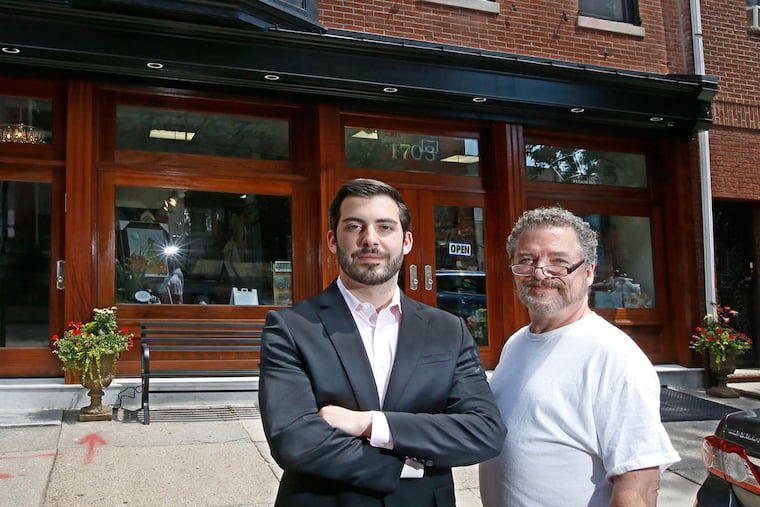Former Rittenhouse Cleaners building finds new mixed-use purpose
His goal, he said, will be "DiCianni Tower," a residential high-rise like no other in Philadelphia. Today, however, Frank DiCianni is more than satisfied with 1703 Pine St., a mixed-use building that the 2012 Drexel grad and son of architect Francesco DiCianni spent six months bringing back to life.

His goal, he said, will be "DiCianni Tower," a residential high-rise like no other in Philadelphia.
Today, however, Frank DiCianni is more than satisfied with 1703 Pine St., a mixed-use building that the 2012 Drexel grad and son of architect Francesco DiCianni spent six months bringing back to life.
"It wasn't even for sale," said DiCianni, who lives in the neighborhood and walks by the building - home of the long-shuttered Rittenhouse Cleaners - every day.
After finding the building's owner in Brooklyn, N.Y., DiCianni said, "I made a deal." The price was $700,000, and the sale closed Oct. 19, according to the city Recorder of Deeds office.
The building, 3,454 square feet on a 1,352-square-foot lot zoned for residential/mixed use, "was in complete disarray," said DiCianni, who has been in construction for the last seven years and had done "a few rentals" in Northeast Philadelphia.
Rittenhouse One-Hour Cleaners, which counted former Gov. Ed Rendell and other movers and shakers as well as athletes as regular customers, was owned for four decades by Arthur Yeagan of Swarthmore, who retired in 2009 and is now deceased.
The building was sold to the Brooklyn investor from whom DiCianni bought it.
"He let it go," said DiCianni, who assumed that the investor had plans for the building that didn't work out. "It was boarded up, and the apartments on the second and third floor were vacant. There was dirt and debris, rubble, broken concrete, and old ductwork."
DiCianni said he saw an opportunity to "make the building really pop, to make the storefront like nothing in the area" - even sketching how he wanted "my first Rittenhouse project to look like."
The Philadelphia Historic Commission played a major role in the direction DiCianni's plans followed.
"I know a lot of developers complain about the commission, but I have nothing but good things to say about it," he said.
"There was a lot of give and take," with the commission wanting a more expensive material in the cornice "even though both were black and you couldn't tell the difference," he said.
Demolition and cleaning of the interior took about two weeks, he said. Salemno Builders & Sons of Oxford Circle did the work, he said.
As DiCianni was working on the building, Dov Leis, owner of Taws Can Do,, the venerable Philadelphia framer, was being priced out of his location at 16th and Locust Streets.
He thought 17th and Pine Streets would be perfect for his business, and "I liked the layout and the storefront," said Leis, who describes himself as a "picture-framing, book-binding, and sleep-deprived individual."
Leis remains enamored of the location, even after working in frigid temperatures over the winter, when the mahogany paneling for the storefront had been mismeasured and arrived too large for the opening and had to be sent back.
"We've been flooded with business since we moved here," Leis said of Formerly Taws, his new store at 17th and Pine.
The space behind Formerly Taws is sublet by Keystone Floorworks, DiCianni said.
The second- and third-floor apartments, which rent for $2,900 and $2,700, were designed and built for "doctors, lawyers, and other professionals," he said, and those are the prospects who have expressed an interest in renting the apartments.
The second-floor apartment opens onto a deck, which "I envisioned the first time I saw the second floor," DiCianni said.
Though many newer and smaller developers are still having trouble obtaining financing for projects, DiCianni was able to work with Penn Community Bank in Bristol.
"It depends on the size of the project," he said, adding that dealing with local banks rather than the big ones is easier.
"Some banks look at smaller projects as taking on too much risk, so you really have to sell them on the location," he said.
Despite the resurgence of the city, "you say 'Rittenhouse,' and many lenders draw a blank," he said.
215-854-2472@alheavens